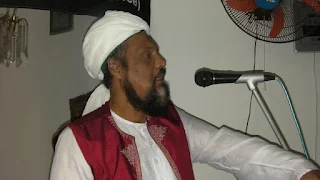The Dogma of 'Khatme Nabuwwat'
On Saturday 26 March 2016
after Salat-ul-Zuhr, a non-Ahmadi Muslim friend gave me a Muslim newspaper (STAR No. 1625) dated 21 to 27 February
2016 wherein was written an article at page 30 on the Seal of Prophethood (part
4). An Imam spoke of the agreement by all the Ulema of the Ummah on the issue. When we look at this clause,
we see that from the first century until today, in each successive generation,
in the entire Muslim world, in every country, theologians are unanimous on this
point that after the Holy Prophet Hazrat Muhammad (pbuh) no one can be a
prophet, and if someone claim the right to this post/ status or one who
believes in such claimant, is a Kafir
(infidel) and out of the pale of Islam.
Then, the Imam in question
reproduced the following evidence, namely the views of these theologians:
 1. Hazrat
Imam-e-Azam Abu Hanifa (ra) [80-150 AH] said (like I told you last Friday): “La Nabi Ba’adi”
(No prophet after me). [Manaqib-ul-Imamul Azam Abu-Hanifa, Labin-e-Ahmedul-Makki,
Vol.1, Pg. 161].
1. Hazrat
Imam-e-Azam Abu Hanifa (ra) [80-150 AH] said (like I told you last Friday): “La Nabi Ba’adi”
(No prophet after me). [Manaqib-ul-Imamul Azam Abu-Hanifa, Labin-e-Ahmedul-Makki,
Vol.1, Pg. 161].
2. Allama Ibn
Jarir-Tabri (ra) [224-310 AH] commented on the verse of the Holy Quran “Walakir-Rasulullah, wa Khatam-an-Nabiyyeen” and explained that he is one who had shut
the door of prophecy and has applied thereon a seal. [Tafsir Ibn Jarir, Vol.22, p. 12].
3.
Allama Ibn
Hazam (ra) Andalusi [384-456 AH] wrote: “Without
a doubt, the continuation of revelation ceased after the death of Rasulullah
(pbuh). The proof is that the revelation is bestowed to a prophet and (he is) the
last of the prophets.” [Al-Muhalla, Vol.1 p. 26].
4. Hazrat Imam
Ghazali (ra) [450-505 AH] wrote in his book ‘Iqtisaad’: “No doubt the Ummah has reached a consensus that through the words’ Khatam-an-Nabiyyeen’
‘the Nabiya Badi’, there will be no Messenger and no Prophet until eternity.”
And then the Imam quoted
others also and pronounced that the Holy Prophet (pbuh) is the last prophet and
said that those who pretend to receive a divine revelation or claim to be a
prophet, will be declared infidel (Kafir)
and has mentioned that in every Muslim country, the great scholars, ‘Fuqaha’, the ‘Muhadditheen’ and ‘Mufassireen’
have all expressed the same opinion about “Khatme
Nabuwwat”.
The meaning of “Khatam-an-Nabiyyeen”
Now I make a small comment
on the meaning of “Khatam-an-Nabiyyeen”
and also put forward the writings of prominent Muslim scholars.
As you know, the term Khatam-an-Nabiyyeen appears in the
Quran in Surah Al-Ahzab. This verse says:
“Muhammad is not the father of
any of your men, but he is the Messenger of Allah, and the Khatam-an-Nabiyyeen (Seal of the Prophets); and Allah has full
knowledge of all things.” (33: 41)
 The Holy Prophet (pbuh)
said: “I was the Khatam-an-Nabiyyeen
before the birth of Prophet Adam.” (Tafsir ibn Kathir, on the authority of
Musnad Ahmad ibn Hanbal).
The Holy Prophet (pbuh)
said: “I was the Khatam-an-Nabiyyeen
before the birth of Prophet Adam.” (Tafsir ibn Kathir, on the authority of
Musnad Ahmad ibn Hanbal).
When his son died, he (pbuh)
said: “Had Ibrahim lived he would have
become a prophet.” (Ibn Majah, Vol.1 Kitabul-Janaiz).
These very significant words
agree with the text of the Holy Quran. They mean that the word Khatam
does not mean ‘the last’ in respect
to the time factor.












